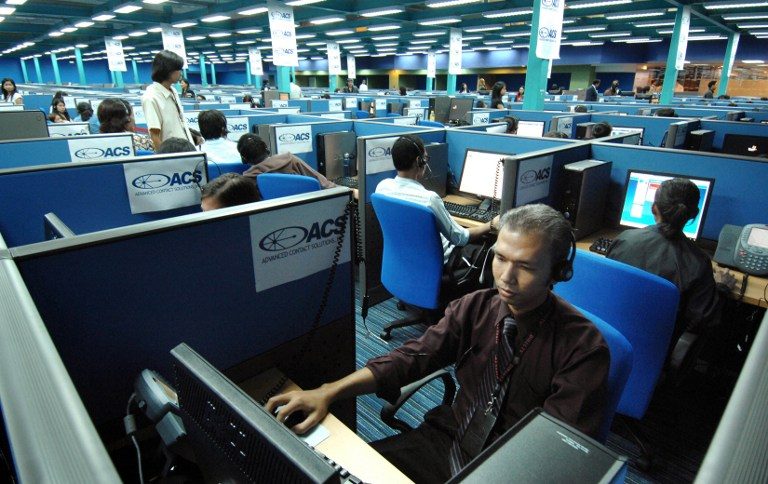SUMMARY
This is AI generated summarization, which may have errors. For context, always refer to the full article.

MANILA, Philippines – The head of the Department of Information and Communications Technology (DICT) sought to ease the concern of the business process outsourcing (BPO) industry that political uncertainty may hurt new investments in the next 6 years.
“The Philippine government through the Department of Information and Communications Technology shall continue what has been started with regard to the BPO industry. Contracts that have been enforced and still existing shall be respected and will continue until their full implementation,” DICT Secretary Rodolfo Salalima told the BPO community on Thursday, October 27, during the release of the 6-year roadmap of the Information Technology and Business Process Association of the Philippines (IBPAP).
There has been growing concern from the BPO sector that President Rodrigo Duterte’s rhetoric against the United States would affect the industry. Duterte’s anti-US tirades have prompted the IBPAP to seek an audience with the President to clarify his stance.
American Chamber of Commerce of the Philippines (AmCham) senior adviser John Forbes also said earlier this month that the chamber was aware of certain BPO investment plans that have been put on hold due to the political uncertainty.
Salalima, however, assured businessmen that Duterte is committed to the growth of the BPO sector.
“The DICT shall continue to fulfill its duties and maintain our strong collaboration with our BPOs. The Philippine government envisions a developed nation that will be dubbed a ‘world-class ICT services provider.’ Together, we will work on this,” he added.
‘Merely being exuberant’
The effect of potential US investors staying away is particularly worrying for the BPO industry as the US is the sector’s dominant source of export revenue, accounting for 72.6% based on data from the Bangko Sentral ng Pilipinas (BSP).
Beyond the natural advantage that Filipinos’ English proficiency provides, US firms have also taken the lead in investing in BPOs beyond voice or call centers, such as in animation or processing legal work.
Duterte had initially announced his “separation” from the US, but later clarified that he only meant charting another way in terms of foreign policy.
Salalima echoed other Cabinet members’ explanations, reiterating that the President was only referring to the country’s independence.
“Freedom from external control means external sovereignty or independence, meaning the Philippines, as an independent state, is independent of or separate from all other states like the USA,” the DICT chief said.
“Thus, when the President therefore also said of the troika of the Philippines, Russia and China ‘against the world,’ he was merely being metaphorical and exuberant of our country’s status as a sovereign state as borne out by his subsequent clarificatory statements.”
New roadmap, higher goals
Recent developments notwithstanding, the BPO industry has high expectations for the next 6 years as spelled out in the new IBPAP roadmap.
As the Philippines’ star industry, the BPO industry exceeded its targets in 2015, generating $22 billion in revenues and 1.1 million direct jobs.
By the end of 2022, the local IT-BPM industry could produce 1.8 million jobs, 73% of which are mid- to high-value. More than 500,000 jobs are also expected to come from outside Metro Manila, according to market research firm Frost & Sullivan, which IBPAP partnered with to create the roadmap.
The industry, it added, also has the potential to generate $40 billion in revenue and increase its global market share to 15%.
“IBPAP’s past two roadmaps – Roadmap 2010 and Roadmap 2016 – have been instrumental in successfully growing the IT-BPM industry. With global trends focusing on artificial intelligence, digital transformation, big data, and new delivery models, it is important that the sector future-proofs itself,” said Danilo Sebastian Reyes, IBPAP board chairman and Genpact Philippines country manager.
“The successful implementation of Roadmap 2022 can only be achieved with the help of all the sub-sectors and stakeholders from both private and public sectors, within and outside the industry. With this roadmap being our bible for growth and innovation, we are hopeful that the Philippines will continuously enjoy strong economic growth through the IT-BPM industry,” he added. – Rappler.com
Add a comment
How does this make you feel?
There are no comments yet. Add your comment to start the conversation.